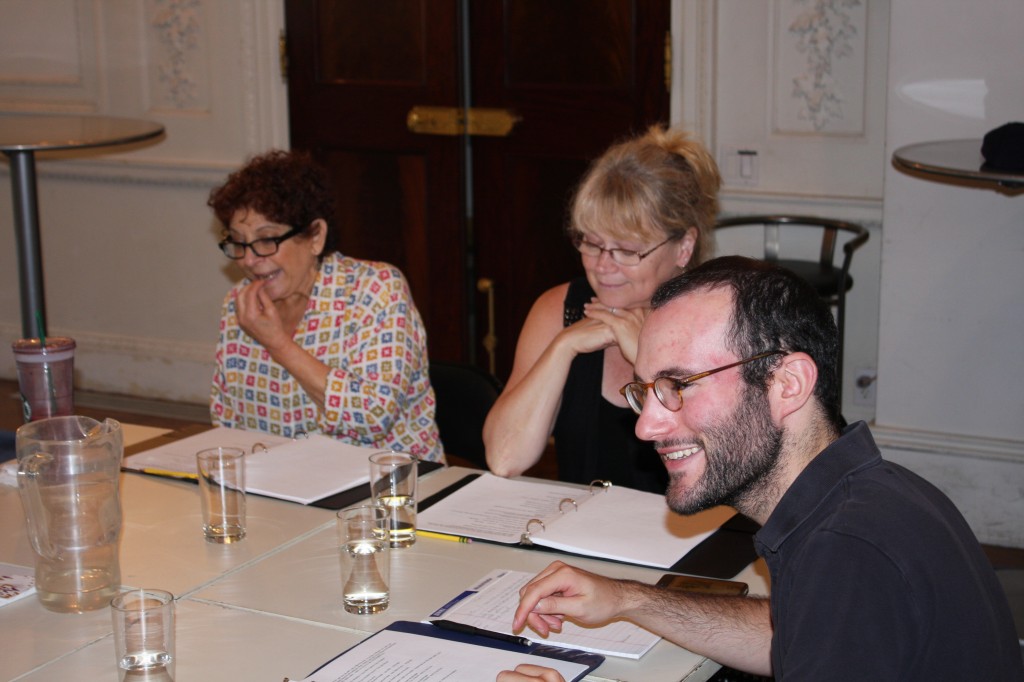Theater Feature: From the Mouths of Female Despots — An Interview With Playwright Theresia Walser
Dramatist Theresia Walser is careful to point out that these women did not merely benefit from the abuses of authoritarian power but perpetrated many of them as well.
I Am Just Like You – I Love Apples by Theresia Walser. Translated from the German by Ingrid MacGillis. A staged reading directed by Guy Ben-Aharon. Presented by German Stage. At the Goethe-Institut, Boston, MA. July 15, 6:30 p.m.
By Ian Thal
It was only this past December that German playwright Theresia Walser was in Boston to attend a staged reading (and American premiere) of her play A Little Calm Before the Storm at the Goethe-Institut. The script revolves around three actors in the green room of a television studio who are preparing to be interviewed about the challenge of portraying Hitler (or, in the case of the less-established of the three, Joseph Goebbels).
The play ends before they appear before the camera.
During the question-and-answer session after the reading, Walser was asked if there was an unwritten second act in the works. Walser had no plans to expand the script, but she mentioned a companion piece, in which the wives of three deposed dictators appear on television to discuss how they wish to be portrayed in a film.
That piece, I Am Just Like You—I Love Apples is making its American premiere via a staged reading by the German Stage at the Goethe Institut. As before, Guy Ben-Aharon directs, and Walser will be present for a post-show discussion. The cast includes Karen MacDonald as Margot Hoenecker, former first lady and education minister of the Soviet-aligned German Democratic Republic, Bobbi Steinbach as Imelda Marcos, former first lady and current member of the Philippine House of Representatives, and Marianna Bassham as Leïla Ben Ali, former first lady of Tunisia and indicted fugitive. Nael Nacer plays Gottfried, a television host whose childhood under the Hoeneckers’s GDR leads him to have his own agenda.
The play’s title implies that the former first ladies will be satirized (broadly) for their vacuousness, but Walser is careful to point out that these women did not merely benefit from the abuses of authoritarian power but perpetrated many of them as well.
In advance of the staged reading, Walser agreed to an email interview about the issues the play raises. Her answers were translated from German to English by Annette Klein, program curator of the Goethe-Institut Boston.
Arts Fuse: The last time you came to Boston it was to attend a staged reading of your play A Little Calm Before the Storm. During the post-show discussion you mentioned a companion piece, I Am Just Like You—I Love Apples. How did the one script lead to the other?
Theresia Walser: First of all, I wanted to write another play with women in the limelight. Secondly, there is the general perception that women who are in a position of leadership, whether directly or indirectly, are supposedly more humane than men. We cannot imagine Stalin or Hitler as a woman. The women I write about, who are rumored sought power and indeed held great power, are sometimes dismissed as standing more or less on the outskirts. However, some of these women were, in fact, the perpetrators of abuses.
Unlike in A Little Calm . . . , here the despots’ wives talk about how they would like to be portrayed in a movie. In other words, we see actors playing dictators’ wives who are discussing how they hope actors will play them one day. Of course, I have read many books about these ladies and listened to stories about them whenever possible. This research I, in turn, reprocessed playfully and freely. Frankly, this biographical material is so monstrous I didn’t have to add much. But in my play, the wives do speak differently than they would in real life, partly because they meet at a press conference focused on how they would like to see themselves portrayed in a film about their lives. The script raises questions about self-portrayal and the perceptions of the portrayer. And so, it is also very much about the theater.
Arts Fuse: Margot Honecker, former first lady and Eeducation minister of the German Democratic Republic, is not only still alive and living in Chile but is still known to appear in the media and complain about the size of the government pension she receives. She also defends such manifestations of communist rule as the Stasi. [The GDR’s foreign intelligence and secret police apparatus, which at its height maintained one informant for every 6.5 citizens and one full-time agent for every 166 citizens.] How have your contemporaries responded to your rendering of a character they know so well and about whom they may have strong opinions?
Walser: We all have a more or less clear picture of Margot Honecker, in particular the people who experienced the GDR.
Of course, this portrait of the Margot Honecker character has a very different resonance in Weimar, which is in former East Germany and where the play started its run a few weeks ago, as it did in Mannheim, which is in the West and the site of the play’s premiere in January. This is in large part due to the fourth character in the play, Gottfried, the interpreter. He is a contradictory figure. On the one hand, he provides the service of an interpreter, but on the other hand, he does take advantage of the latitude of his role and the small—yet sometimes quite far-reaching—power that goes along with this position. He is an instigator: he juggles as he sees fit, though we learn over time that he is much too involved to remain a neutral mediator. It turns out that he himself experienced Frau Margot’s regime first hand as a child and young man.
Arts Fuse: When you were last in Boston, you mentioned that one of the characters in I Am Just Like You—I Love Apples was a composite of a number of different wives of Arab dictators. But according to the press releases for this production, the character is now identified as Leïla Ben Ali, the wife of deposed Tunisian President Zine el-Abidine Ben Ali. What inspired this greater specificity?
Walser: Any specific identification limits you to a one-way path. My Frau Leila remains a mixture of multiple ‘One Thousand and One Nights’ dictator spouses: Leïla Ben-Ali, Suzanne Mubarak, and Asma Assad. Frau Leïla is the most up-to-date though, since for the past two years we have been bombarded with pictures from Arabian World news reports. Despite the scripts references to reality, these three women are theatrical characters. This is not documentary theater.

Bobbie Steinbach and Karen MacDonald rehearsing I AM JUST LIKE YOU—I LOVE APPLES with German Stage director Guy Ben-Aharon.
Arts Fuse: Imelda Marcos, though best known for her extravagance, including owning over 1,000 pairs of shoes, has had a particularly interesting second career. Unlike either Ali or Honecker, she has not only returned to the Philippines, but she has also staged a moderately successful political career. What advice does she have for other female despots seeking a second career?
Walser: Imelda Marcos comes across as a character in a dreadful, grotesque fairytale. In my play, she states, “I have always only lived for the beautiful.” She is positively a self-portrayal-monster.
Arts Fuse: In A Little Calm Before The Storm, your characters proffered their pet theories about how to portray evil. Now, you are creating three characters, who, if not evil, have been corrupted by their proximity to evil. Are you any closer than before to having your own explanation for evil?
Walser: The good alone has never stood on its own for longer than five minutes in serious theater. In all of us there lies something malignant, ranging from quiet intolerance to occasional destructiveness. In this respect, the images of evil suggested by the play are only a magnification of what we all already recognize in ourselves in some form or other. In this way, the comic aspect of the script is very important to me. Our laughing at these characters’ appalling perceptions of themselves does not diminish them—it reveals the surreality of their thought and the absurdity of their reasoning. Observing these figures from a distance raises compelling questions—how could these people possibly have obtained such power?
Tagged: German Stage, German theater, Goethe-Institut, Guy Ben-Aharon, Theresia Walser


